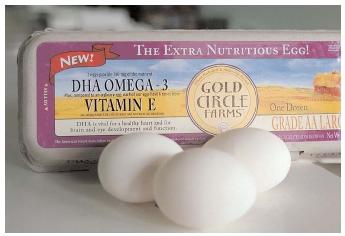Eggs: I am so confused?!?
Filed under: General Health, Nutrition
Here is an often-asked question that is a tough one to answer. It really can go a few different ways, and there isn’t only one “right” answer. If you want more info on why eggs kick ass, I wrote about it HERE.
Q: Hey Brian,
At my grocery store there are Omega 3 eggs that aren’t organic and organic eggs that say nothing about having omega 3′s, is one a better choice over the other?
Thanks.

A: Eggs are another one of those things that there isn’t one perfect answer. Ideally we would get eggs from hens allowed to pasture on grass/insects/maggots/etc. This would be awesome. I went into more detail on why this is awesome HERE. Unfortunately this isn’t how most eggs are produced.
In order for eggs to be organic they only have to be fed organic grain, which is only slightly healthier. They, like cows, are not supposed to subsist on so much corn, it is not healthy for them. Though some organic eggs are from hens that are allowed to actually go outdoors (not just have “access to”), it isn’t a requirement. The one big benefit is that these hens are not give antibiotics, hormones or fed animal byproducts like regular eggs are. They should be slightly healthier and may contain a slightly higher content of omega-3 eggs.

Omega-3 eggs are fed a diet rich in soy, rapeseed (which is what canola is made from) and/or flax. This higher consumption of omega-3′s makes its way into their eggs. They are also not necessarily treated better, and they are usually still subsisting on a lot of corn, just interspersed with the soy, rapessed or flax. Again, it is only marginally better, but better none the less. They are also usually not given hormones or antibiotics. Labels will state this to use as a selling point, and it does make a difference. I usually lean towards omega-3 eggs in stores because at least they are being fed a little something better for them, they will have a significantly higher omega-3 content for their own health, and it gets passed on to us. Organic eggs may have the same benefits, but it isn’t a given. Just remember that as much as organic can be better, it does not always equal better.

There are also some options at most stores where you can get eggs from hens that are treated a little better and provided a better diet, and are your closest bet to eggs from hens allowed to pasture and range and consume their normal diet. Azuluna eggs are blue shelled eggs from a different breed of hens that are allowed to pasture and feed on their more natural diet. They make silky and very flavorful eggs. They have a much more orange yolk, indicating a higher beta-carotene content and just a greater assimilation of nutrients. The only downfall is that these eggs are crazy expensive, so if you eat 4-5/day like myself, that number adds up really fast. Good luck!
Check out the BSP Training & Nutrition Newsletter!
You will get immediate access to:
- Weekly updates and exclusive content.
- The 20-page report "The Truth About Saturated Fat & Cholesterol."
- Become more awesome!
Posted on October 29th, 2009 by Brian St. Pierre
3 Comments




October 29th, 2009 at 1:04 pm
Brian,
I found the following quote from an egg article on mercola.com Typically it can be hard to determine what is legitimate and what is hyperbole when perusing that site. There seems to be a wealth of quality information, but everything also seems to get taken to the Nth degree, which may not necessarily be a good idea, either.
“As for eggs advertised as having omega-3 fat added, this may not be as good as the manufacturers are leading you to believe. If they are using flaxseed to increase the omega-3 fats in the eggs, it won’t be as beneficial as if they fed the chickens seaweed or kelp, which have the far more beneficial DHA and EPA, as opposed to ALA in flax.
Also, typically the chickens are fed poor-quality sources of omega-3 fats that are already oxidized. Additionally, omega-3 eggs are far more perishable than non-omega-3 eggs so they don’t stay fresh nearly as long.”
How big an issue is chickens being fed a diet with ALA that has already been oxidized/damaged? This seems like something difficult to track, and it is obviously not possible just to look at an egg and know if the diet of the animal had contained damaged fats.
Additionally, I am wondering about the potential for damage to the omega 3 fats in these eggs when being cooked. Is this a potential issue as well?
October 29th, 2009 at 6:39 pm
Jack:
It seems unclear as to whether consumption of oxidized omega-3 fatty acids is cause for concern.
A number of the beneficial effects of omega-3 fatty acids are dependent upon their oxidation.
“Oxidized omega-3 fatty acids in fish oil inhibit leukocyte-endothelial interactions through activation of PPARalpha”
http://bloodjournal.hematologylibrary.org/cgi/content/full/100/4/1340
“Oxidized omega-3 fatty acids inhibit pro-inflammatory responses in glomerular endothelial cells.”
http://www.ncbi.nlm.nih.gov/pubmed/15331934?ordinalpos=1&itool=EntrezSystem2.PEntrez.Pubmed.Pubmed_ResultsPanel.Pubmed_SingleItemSupl.Pubmed_Discovery_RA&linkpos=1&log$=relatedarticles&logdbfrom=pubmed
“Inhibition of leukocyte-endothelial interactions by oxidized omega-3 fatty acids: a novel mechanism for the anti-inflammatory effects of omega-3 fatty acids in fish oil.”
http://www.ncbi.nlm.nih.gov/pubmed/12625944?ordinalpos=1&itool=EntrezSystem2.PEntrez.Pubmed.Pubmed_ResultsPanel.Pubmed_SingleItemSupl.Pubmed_Discovery_RA&linkpos=4&log$=relatedreviews&logdbfrom=pubmed
April 17th, 2011 at 5:00 pm
When you are courting a nice girl an hour seems like a second. When you sit on a red-hot cinder a second seems like an hour. That’s relativity. – Albert Einstein